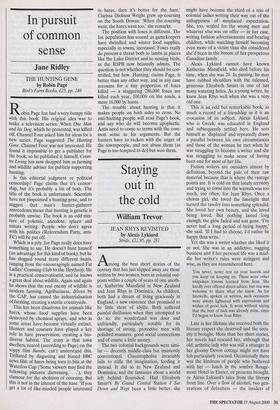In pursuit of common sense
Jane Ridley
THE HUNTING GENE by Robin Page Bird's Farm Books, £25, pp. 240 Robin Page has had a very bumpy ride with this book. His original idea was to make a television series. When One Man and his Dog, which he presented, was killed off, Channel Four asked him for ideas for a new series. Page suggested The Hunting Gene. Channel Four was not interested. He found it impossible to get a publisher for the book, so he published it himself. Coun- try Living has now dropped him as farming and wildlife adviser for publicly supporting hunting.
Is this editorial judgment or political censorship? Page claims that it's censor- ship, but it's probably a bit of both. The title of the book is unfortunate. Scientists have not pinpointed a hunting gene, and to suggest that man's hunter-gatherer antecedents mean that hunting is genetic is probably unwise. The book is an odd mix- ture of polemic, anecdote, spleen and nature writing. People who don't agree with his politics (Referendum Party, anti- EC) will be put off.
Which is a pity, for Page really does have something to say. He doesn't hunt himself (an advantage for this kind of book), but he has slogged round many different hunts, ranging from the encouragingly named Fat Ladies' Coursing Club to the Heythrop. He is a practical conservationist, and he knows a great deal about wildlife. Again and again he shows that the real enemy of wildlife is modern farming. Agribusiness, driven by the CAP, has caused the industrialisation of farming, creating a sterile countryside.
This has been disastrous for animals like hares, whose food supplies have been destroyed by chemical sprays, and who in some areas have become virtually extinct. Hunters and coursers have played a key role in hare preservation, creating a bio- diverse habitat. The irony is that town dwellers, reared (according to Page) on the soppy film Bambi, can't understand this. Titillated by disgusting and biased BBC news film of hares being torn to bits at the Waterloo Cup (`Some viewers may find the following pictures distressing. . .'), they clamour for the abolition of coursing. But this is not in the interest of the hare. 'If you get a lot of like-minded people interested in hares, then it's better for the hare.' Clarissa Dickson Wright grew up coursing on the South Downs: 'When the coursing went, the hares went too,' she remarks.
The position with foxes is different. The fox population has soared as gamekeepers have dwindled and winter food supplies, especially in towns, increased. Foxes really do present a threat both to lambs in places like the Lake District and to nesting birds, as the RSPB now belatedly admits. The question is not whether they should be con- trolled, but how. Hunting, claims Page, is better than any other way, and in any case accounts for a tiny proportion of foxes killed — a staggering 286,000 foxes are killed each year, 100,000 on the roads, a mere 16,000 by hunts.
The trouble about hunting is that it makes people on both sides so cross. No anti-hunting people will read Page's book, and any who do will become apoplectic. Antis need to come to terms with the com- mon sense in his arguments. But the hunters have to reckon with the anger of the townspeople, and not abuse them (as Page is too tempted to do) but woo them.


























































 Previous page
Previous page